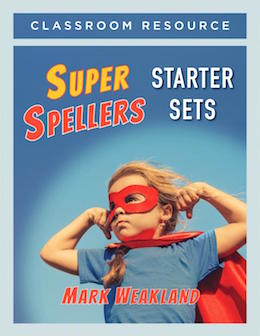Lessons to Power Up Your Super Spellers
Super Spellers Starter Sets
By Mark Weakland
(Stenhouse Publishers, 2019 – Learn more)
Last year I reviewed Super Spellers: Seven Steps to Transforming Your Spelling Instruction by Mark Weakland. In this book, Weakland presents a transformative way to teach spelling using a developmental approach that provides students with strategies and tools to become proficient spellers.
Rather than memorizing a list of words, students learn to use strategies to notice patterns, think about meaning, listen for sounds, and apply letters to sounds. The overarching idea is that teaching spelling (not just learning word lists) helps to increase reading and writing skills. I quickly put Weakland’s ideas to work with my fifth graders with good results.
In his latest book, Super Spellers Starter Sets, Weakland provides a classroom resource to support his principles. It is important to note that this resource is not based on a scope or sequence from any particular spelling program. The idea is that spelling should not simply be a list of words to know for a test, rather spelling should be a learned skill.
What’s in the latest book

A pre-test can be given to help determine what students know so you can create differentiated groups and a post-test is provided to formatively assess. Also included is a blackline master of word cards for word-sorting activities, word ladders, and suggestions for language to use during word and sentence dictation activities.
The lesson sets provide a start to help teachers internalize the lesson components in order to eventually create their own additional lesson sets for any spelling feature or convention. Using Weakland’s first book, Super Spellers: Seven Steps to Transforming Your Spelling Instruction, along with this resource is useful as teachers can delve deeper into the ideas, strategies and activities that are included.
Super Spellers in grades 4-5 and beyond
I agree with the philosophy of spelling being a critical part of reading and writing instruction. As readers, it is important for students to have a set of strategies to use authentically when they come across an unknown word in their reading.
In the upper grades, Weakland points out, “affixes and Greek and Latin roots take center stage. It’s at this point that teaching students to pay attention to meaning really pays off.” (p.24) Weakland’s advice about teaching students to “think about meaning” made me recall my own recent lesson on words ending in “phone” and “graph”.
Some of my fifth grade students were having trouble understanding the meaning of words with these endings until we took time to look closely at examples such as “homograph” and “homophone” and broke down each word noticing similarity and difference.
Breaking down word meanings then led to brainstorming examples of words to categorize. For example,”homo-” comes from the Greek word homós which means “one and the same.” So all of the “homo-” words describe some type of sameness. Then we looked to the difference in each word to find meaning: “phone” comes from the Greek word phōnḗ meaning “voice”and “graph” comes from the Greek word meaning “drawn or written.”
Breaking down the word parts helped my students understand the meaning and spell the words correctly. Moving further into the lesson, the students came up with examples that illustrated a “homophone” and a “homograph.” In the case of “homophones” we looked for words that sound the same but have different meanings, including there, their, they’re. For “homographs” (words that have the same written form but different meanings) we came up with examples such as bear, an animal, and bear, to carry or support.
Both books are easy to use
Using strategies to help students learn – not just memorize – spelling is essential to greater reading comprehension and more depth in writing. This is one of several useful strategies Weakland offers throughout the book.
This classroom resource provides strategies and materials that are easy to use. I would recommend using both Super Spellers: Seven Steps to Transforming Your Spelling Instruction and Super Spellers Starter Sets by Mark Weakland. By incorporating the components from the provided lesson sets to create your own targeted lessons you will boost students reading and writing skills without the drill and kill of traditional “spelling list” methods.
Kathleen Palmieri is a fifth grade teacher in upstate New York who reviews regularly for MiddleWeb. With a passion for literacy and learning in the classroom, she participates in various writing workshops and curriculum writing endeavors. As a lifelong learner, she is an avid reader and researcher of educational practices and techniques. Collaborating with colleagues and globally on Twitter @Kathie042500 is an ongoing practice.





































These books sound wonderful! Thank you for the review.